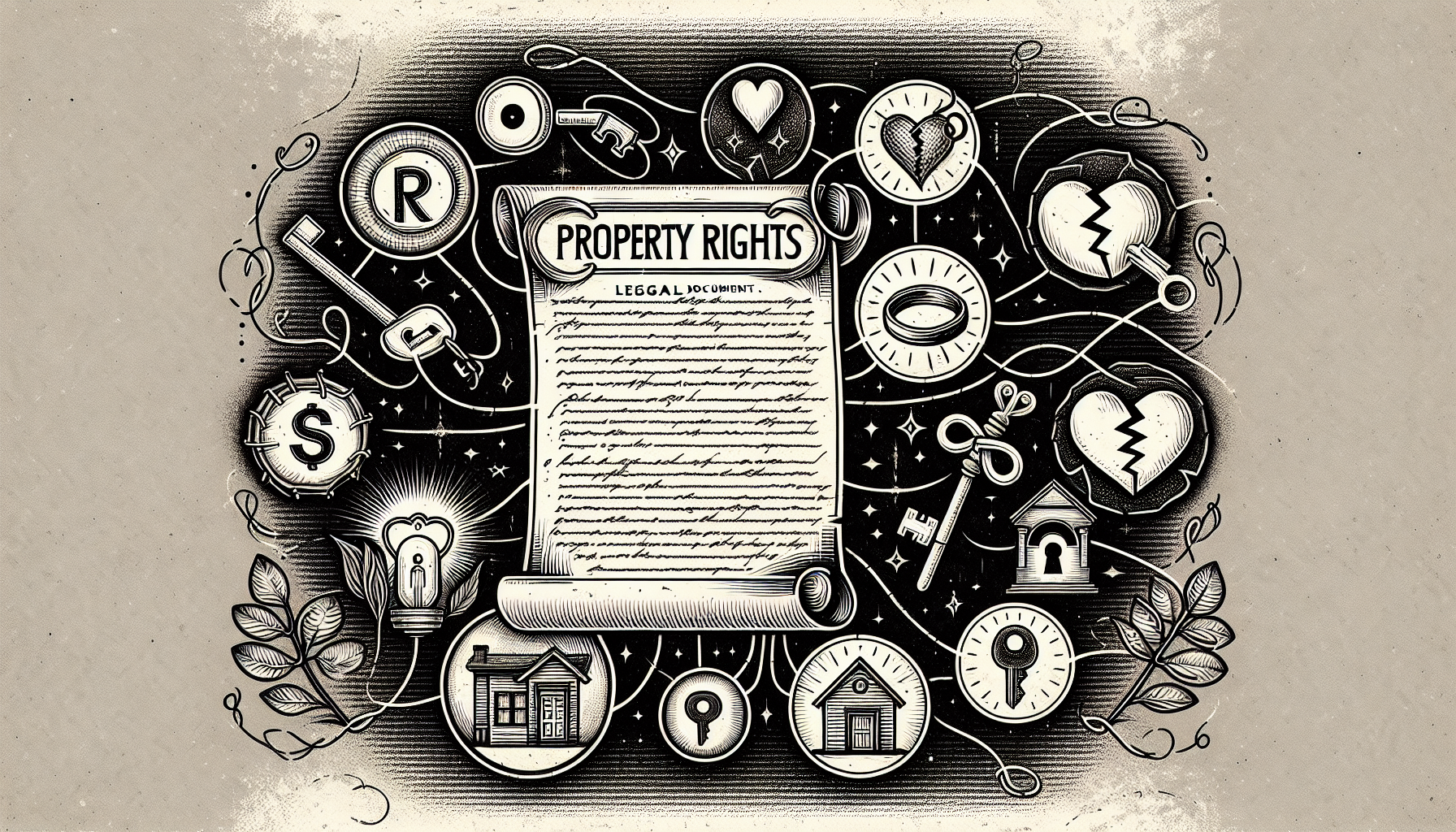If you own the house and want your boyfriend to move out, you may wonder, “Do I have to evict my boyfriend if I own the house?” This article will guide you through your legal rights, the necessary steps for eviction, and potential complications. We’ll also explore alternative solutions to help you navigate this challenging situation smoothly.
Key Takeaways
Understanding property rights is essential when dealing with shared property after a breakup, as knowing who owns what can help resolve potential disputes fairly.
Evicting a partner requires complying with local eviction laws, which often demand ‘just cause’ and due process to prevent any legal challenges.
Alternatives to formal eviction, such as mediation, negotiation, or financial incentives, can provide less stressful resolutions without going to court.
Introduction

Venturing into the thorny thicket of a relationship’s end, one finds themselves at a junction of emotional turmoil and pressing legal matters. The complexities of separation can indeed be daunting, but when the dust settles, there is a need to understand the implications of property rights, eviction law, and how to navigate the choppy waters of a shared living situation post-breakup.
The introduction of this blog aims to equip you with key insights and strategies to manage the difficult transition, emphasizing that proper planning and communication can not only mitigate the emotional fallout but might also benefit the relationship in the long run, whether it leads to reconciliation or a final goodbye.
Understanding Property Rights in Personal Relationships

When two lives are interwoven through marriage, the concept of personal property often becomes entangled in the broader notion of marital assets. The marital home, a nucleus of family life, transforms into a significant part of the marital estate, governed by the principles of family law. Within the context of property rights, understanding who owns what—and who has the right to occupy the shared property—is critical before initiating the eviction of a partner.
The interplay between personal property and marital property is a cornerstone of property rights in a marriage. Should the relationship fray, these rights can become a battleground, making it essential for each party to seek a clear understanding of their legal standing. This knowledge is not just about who stays and who leaves; it’s about laying the groundwork for the future division of marital assets and ensuring that property disputes are resolved fairly.
Legal Grounds for Eviction
The stark reality is that eviction, when it comes to removing a partner from the house you share, is not as simple as changing the locks. Legal help is paramount, as the process must align with the strictures of local laws. Whether you’re in California or elsewhere, the reason for eviction must fall under certain legally recognized circumstances. For instance, one cannot whimsically decide that their soon-to-be ex should find a new residence simply because they no longer wish to live under one roof.
California law, for example, requires ‘just cause’ for eviction, categorizing reasons as either ‘at fault,’ such as nonpayment of rent or criminal activity, or ‘no fault,’ like the owner moving in. Regardless of the reason, your partner’s residence cannot be terminated without due process. This underscores the importance of understanding the grounds upon which you can legally request an eviction, as any misstep could put you at risk of legal challenges.
The Eviction Process: Step-by-Step Guide
Embarking on the divorce process, especially when it culminates in eviction, requires a clear understanding of the steps involved. Divorce proceedings can be fraught with emotion and legal intricacies, but knowing the roadmap through the eviction landscape can provide a semblance of control during this tumultuous time.
Let’s walk through the critical stages of this process, from serving an eviction notice to the final judgment in court.
Serving an Eviction Notice
The initiation of divorce proceedings often brings a flood of important documents, and at the forefront is the eviction notice—a document that sets the stage for a possible departure from the marital home. Serving an eviction notice is more than a formality; it’s a critical first step in legally communicating to your partner the need to vacate the premises. This notice must be thorough, citing the reason for eviction and providing a clear timeframe for compliance.
In California, the law stipulates specific ways to deliver this notice, including hand delivery to the tenant, leaving it with another adult at the residence, or using the mail. Whichever method you choose, it’s crucial that the delivery aligns with legal requirements to ensure the eviction process isn’t derailed by procedural issues.
Filing for Eviction in Court
If the rent is unpaid or the terms of the lease are breached, and your partner ignores the eviction notice, the next step is to seek divorce process help by filing for eviction in court. This legal move, while daunting, is a necessary step in reclaiming your home. You’ll need to gather the necessary paperwork, including the lease agreement, the original eviction notice, and proof that the notice was delivered appropriately.
With documents in hand, you’ll approach the family law court to submit your filings, including a complaint form and a filing fee, which can vary in cost. Whether it’s a simple divorce case or a complex child custody matter, the court will become the stage where you and your ex-spouse present evidence to justify the eviction. It’s essential to continue paying attention to detail at this stage, as any oversight can affect the outcome of the proceedings.
Court Hearing and Judgment
The divorce process and subsequent court hearings can feel like a marathon, with each step laden with bank statements, legal documents, and the emotional weight of a child custody case. The court hearing is where the rubber meets the road; it’s your opportunity to:
Present your case before a judge
Provide evidence and arguments
Have the judge decide based on your and your partner’s evidence and arguments.
If the judge rules in your favor, a Judgment of Possession is issued, granting you the right to reclaim your property. Should your partner continue to resist leaving, a Writ of Execution empowers law enforcement to enforce the eviction. It’s a moment of both relief and finality, marking the end of one chapter and the beginning of another.
Potential Complications of Evicting a Partner

Navigating the divorce process is rarely straightforward, and evicting a partner can introduce a set of complications that extend beyond the courtroom. The emotional stress of such proceedings can amplify existing tensions, sometimes leading to unexpected legal challenges. If your soon-to-be ex decides to contest the eviction, brace yourself for what could lead to a prolonged and draining dispute.
In divorce proceedings, the remaining spouse often feels a mixture of relief and guilt when deciding to ask the other spouse to leave. It’s a delicate balance between asserting one’s rights and managing the emotional fallout that accompanies such a significant life change. These complications underscore the importance of being prepared for all eventualities when considering a spouse’s eviction.
Alternatives to Eviction
But what if there was a way to circumvent the legal battles and the emotional turbulence of eviction? Exploring alternatives can offer a reprieve, presenting options that could lead to a resolution without setting foot in a courtroom. Some alternatives to consider include:
Mediation: Provides a platform for both parties to discuss their perspectives with the aid of a neutral third party. This could result in an agreement satisfying both sides, potentially saving on living expenses and establishing two homes.
Negotiation: Directly communicating with the landlord or tenant to find a mutually beneficial solution.
Rent repayment plans: Working out a plan to repay any outstanding rent in installments rather than facing immediate eviction.
Temporary housing assistance: Seeking assistance from local organizations or government programs that provide temporary housing options for those facing eviction.
By exploring these alternatives, you may be able to find a resolution that avoids the stress and costs associated with eviction.
Sometimes, the right choice may involve a financial incentive, like ‘cash for keys,’ which can encourage your partner to vacate the property voluntarily. Additionally, providing support, such as assistance with moving expenses or offering connections to other rental properties, may ease the transition for the occupant. These alternatives can offer a more peaceful resolution, allowing both parties to avoid the stress of formal eviction proceedings.
Domestic Violence Considerations
In situations where domestic violence is a factor, the divorce process takes on an even more critical dimension. The safety of all involved, especially children, must be the primary consideration when deciding whether to proceed with eviction. Emergency Protective Orders and Restraining Orders After Hearing are legal instruments designed to provide immediate and long-term protection, respectively, from an abusive partner.
If you find yourself in a threatening situation, it is imperative to prioritize your safety and that of your family. Seeking assistance from a family law attorney can be a crucial step in securing an ex parte order, which can provide the necessary legal protection to exclude a partner from the residence. It is essential to act swiftly and decisively in such circumstances, as the implications of domestic violence are severe and can profoundly affect the outcome of divorce and child custody cases.
Protecting Your Property and Personal Assets
Amidst the upheaval of leaving the marital home, safeguarding your personal assets takes on increased importance when you decide to leave the marital home. Whether it’s ensuring access to vital documents like insurance policies and retirement accounts or changing the locks to maintain control over your property, these steps are vital in protecting your finances and personal belongings.
It is critical to take the following steps after a divorce:
Document all financial transactions.
Change passwords to secure your personal information.
Place a change of address request with the Post Office to safeguard your mail and reduce the risk of identity theft.
These measures are not only about security but also about asserting your independence and taking a proactive role in shaping your post-divorce future.
Consulting a Family Law Attorney
In navigating the intricacies of marital property and the divorce process, the guidance of a family law attorney can be invaluable. From understanding the grounds for eviction to negotiating child support and spousal support, a legal professional brings clarity and expertise to a complex situation. If you’re contemplating leaving the marital home, consulting an attorney early on can ensure that you make informed decisions and that your rights are protected.
An attorney will not only advise on the legal steps involved in eviction but will also provide a critical review of any settlement agreements, ensuring that you fully understand the terms and ramifications. Whether it involves marital misconduct or simply the logistics of one spouse leaving the family home, a family law attorney can advocate on your behalf, helping you navigate the divorce and custody cases with your interests at the forefront.
Summary
In summary, whether you stay in the marital home as long as possible or decide to leave, the complexities surrounding the eviction of a partner are multifaceted and laden with potential pitfalls. Through this journey, we’ve explored the legal grounds for eviction, the step-by-step process, and how to protect your assets and well-being. Above all, we’ve emphasized the importance of seeking legal help and considering all options before proceeding. May this guide serve as a beacon, illuminating the path through one of life’s most challenging transitions.
Frequently Asked Questions
What constitutes ‘just cause’ for evicting a partner from the marital home?
‘Just cause’ for evicting a partner from the marital home includes ‘at fault’ reasons such as nonpayment of rent, breach of lease terms, or criminal activity on the premises, as well as ‘no fault’ reasons like the owner moving in, substantial rehabilitation of the property, or compliance with government orders.
Can I change the locks to keep my partner out of the house during divorce proceedings?
Yes, you can change the locks to keep your partner out of the house once they have moved out, but it’s important to consult a family law attorney to ensure you do so legally.
What alternatives to eviction can I consider to avoid a legal battle?
Consider alternatives to eviction such as mediation, ‘cash for keys’ incentives, and offering assistance with moving or connections to other rental properties in order to avoid a legal battle. These options can help facilitate a smoother transition for all parties involved.
How can I protect my assets if I decide to leave the marital home?
To protect your assets when leaving the marital home, it’s important to maintain control of essential documents like insurance policies and bank statements, change passwords to accounts, and document financial transactions transparently. This will help safeguard your financial interests during the transition.
Should I consult a family law attorney even if I believe my divorce will be amicable?
Yes, it’s important to consult a family law attorney even in an amicable divorce to ensure your legal rights are protected and to receive guidance on documentation and settlement agreements.

